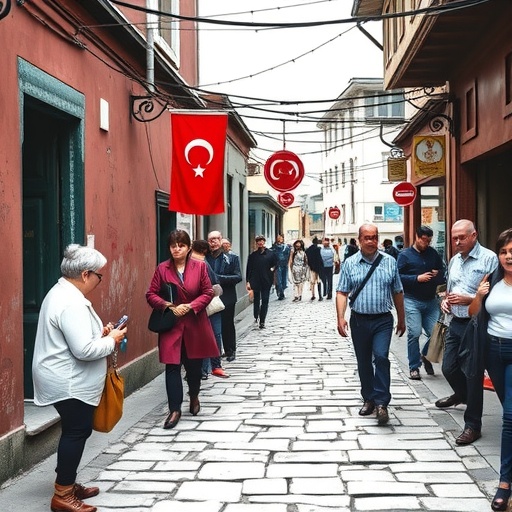Cultural Adaptation Experiences of Long-term Older Turkish Immigrants: A Qualitative Study
In the ever-evolving tapestry of global migration, the experiences of older immigrants often remain overshadowed. A profound qualitative study has unveiled critical insights into the cultural adaptation journeys of long-term older Turkish immigrants, shedding light on the resilience and challenges these individuals face as they navigate a new world while rooted in their heritage. This exploration, set against the backdrop of contemporary societal shifts, has significant implications for understanding cultural integration and support mechanisms across multicultural societies.
The study undertaken by Ilgaz, Temür, and Şahin emphasizes the multifaceted nature of cultural adaptation. Older immigrants, often perceived through a narrow lens of nostalgia or hardship, embody a spectrum of rich experiences that reveal both the triumphs and tribulations of their lives in a foreign context. The researchers conducted extensive interviews, providing a deep dive into the emotional and practical aspects of cultural adaptation. These narratives are not merely personal stories; they represent a microcosm of larger societal patterns that demand attention.
Among the key findings of this qualitative study is the concept of identity negotiation. For older Turkish immigrants, the process of fostering a dual identity—balancing their traditional Turkish roots while embracing their new environment—is both crucial and challenging. This negotiation often involves a re-evaluation of values, beliefs, and practices, creating a dynamic interplay between the past and present, the familiar and the foreign. Many participants expressed a deep yearning for connection with their cultural heritage, even as they sought to assimilate into their new surroundings.
Language emerged as a significant barrier in the adaptation process. The study revealed that proficiency in the host country’s language is pivotal not only for day-to-day interaction but also for fostering social connections and accessing essential services. Many older immigrants reported feelings of isolation due to language limitations, emphasizing the need for targeted language programs that cater to the unique situations faced by this demographic. These insights highlight the importance of linguistic inclusion in promoting social cohesion and emotional well-being among older immigrant populations.
The role of community support cannot be overstated. The research illustrated how local Turkish communities serve as critical support networks for older immigrants, offering both emotional and practical assistance. Social gatherings, cultural events, and community centers act as lifelines, fostering a sense of belonging and continuity. These networks not only provide a space for cultural expression but also enhance mental well-being, allowing older immigrants to share their experiences and create a shared identity with others who understand their journey.
Moreover, the study sheds light on the psychological toll of immigration. Many participants discussed feelings of anxiety and depression tied to the challenges of adaptation, such as navigating bureaucratic systems and coping with the loss of familiar social structures. The findings underscore the necessity for mental health resources tailored to the immigrant experience, promoting greater awareness and support for the emotional facets of cultural adaptation.
The researchers also examined the impact of intergenerational relationships on adaptation experiences. Many older participants noted the importance of their families, particularly their children, in aiding their integration. Children often serve as cultural intermediaries, bridging the gap between their parents’ traditional values and the evolving societal norms of their new home. This intergenerational exchange facilitates a cultural dialogue that enriches both the younger and older generations while aiding in the adaptation process.
Furthermore, the study highlights the intersectionality of age, gender, and socioeconomic status in the adaptation experiences of older Turkish immigrants. Female participants often faced unique challenges, including gender-specific expectations regarding caregiving and community involvement, which influenced their adaptation trajectories. By acknowledging these intersecting identities, the research contributes to a more nuanced understanding of how different facets of identity shape the immigrant experience.
In addressing the cultural adaptation of older immigrants, the study prompts broader societal discussions on inclusivity and representation. Policymakers and community leaders are called to consider the unique needs of this demographic, advocating for programs that not only assist with practical adaptation but also honor and celebrate cultural heritage. Such initiatives can lead to more harmonious multicultural societies, where diversity is not only acknowledged but actively embraced.
As the world grapples with increasing migration flows, this qualitative study serves as a crucial reminder of the human aspects of immigration. The cultural adaptation experiences of older Turkish immigrants are emblematic of broader trends in the global migration landscape, highlighting the complexities involved in integrating into a new society while preserving one’s identity. The narratives shared by the participants not only enrich our understanding of this process but also call for compassion and action from those in positions to effect change.
Finally, it is essential to disseminate these findings widely, ensuring that the voices of older immigrants are heard and acknowledged. Academic circles, policy discussions, and public discourse must integrate these insights to create more inclusive environments that truly support cultural adaptation. The study stands as a testament to the resilience of older Turkish immigrants, illuminating their unique journeys while advocating for a collective effort to foster understanding and support.
In reflecting on the study’s outcomes, the research contributes significantly to the fields of sociology, gerontology, and cultural studies, providing a valuable framework for future investigations into immigrant experiences. It advocates for a deeper exploration of cultural adaptation within aging populations and underscores the critical need for tailored interventions that pave the way for smoother transitions into society. As we move forward, embracing and understanding the complexities of cultural adaptation will be pivotal in shaping societies that thrive on diversity and mutual respect.
Subject of Research: Cultural adaptation experiences of long-term older Turkish immigrants
Article Title: Cultural adaptation experiences of long-term older Turkish immigrants: a qualitative study
Article References: Ilgaz, A., Temür, B.N., Şahin, S. et al. Cultural adaptation experiences of long-term older Turkish immigrants: a qualitative study. BMC Nurs 24, 1197 (2025). https://doi.org/10.1186/s12912-025-03848-6
Image Credits: AI Generated
DOI: 10.1186/s12912-025-03848-6
Keywords: cultural adaptation, older immigrants, Turkish diaspora, qualitative study, identity negotiation, community support, language barriers, intergenerational relationships, mental health, inclusivity, migration, resilience, diversity




